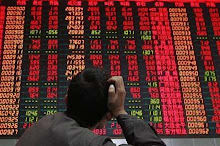What an election it was! Congratulations Barack Obama; America believes you are the one who will fix this country and bring true positive change to Washington. But how was the market on election day?
According to the New York Times "reduced volatility and easing in the credit markets helped give stocks their strongest Election Day rally in 24 years." The S&P 500 closed above 1000, the first time since Oct.13 and the Nasdaq continued its positive gain for the sixth time in a row. "At the close, the Dow Jones industrial average was up 3.28 percent, or 305.45 points, to 9,625.28."
It seems the volatility of the market had calmed on election day. Globally, international markets had risen as well. The Tokyo Nikkei rose 2.8 percent, according to the New York Times, and "he Dow Jones Euro Stoxx 50 index, a barometer of euro zone blue chips, rose 5.56 percent, while the FTSE 100 index in London jumped 4.42 percent. The CAC 40 in Paris gained 4.62 percent, and the DAX in Frankfurt was up 5 percent."
So what do you think America? Are the gains from election day reflecting the hopeful Americans who believe in Barack Obama? Has the "bear market" taken a rest and are the next 4 years destined for positive change?
On being Lucio Tan Jr.
6 years ago
